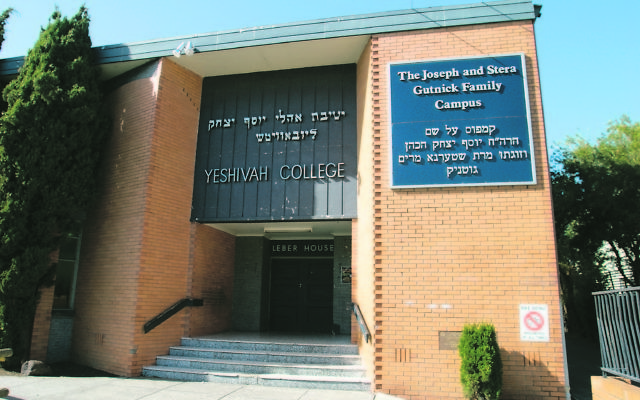Royal Commission slams institutions and rabbis
Twenty-five Jewish victims of child sexual abuse spoke to the Royal Commission in private hearings, according to its final report released last Friday.
TWENTY-FIVE Jewish victims of child sexual abuse spoke to the Royal Commission in private hearings.
The number of survivors, which was revealed in the final report of the Royal Commission last Friday, “almost certainly under-represents the total number of victims” and “likely under-represents victims of more recent abuse” the Royal Commission found.
Of those 25 victims, 15 were abused at Yeshivah in Melbourne or Yeshiva in Sydney, the average age of victims when they were first abused was 11.3 years old and all 25 survivors were abused by men.
“Most of the perpetrators we heard about were teachers. We also heard about perpetrators who were people in religious ministry (rabbis), ancillary staff at the institutions or volunteers,” the Royal Commission’s final report said.
The report also stated, for the first time, that members of Manny Waks’ family were “secondary victims of the child sexual abuse that he experienced” because they were shunned by the community when Waks became the first Yeshivah victim to publicly reveal he was abused within the organisation.
It also found that although rabbis publicly stated that the prohibition of mesirah, reporting to secular authorities, did not apply to victims of child sexual abuse, senior members of the Yeshivah Melbourne and Yeshiva Bondi communities continued to give the impression that the prohibition of mesirah was valid.
“All Jewish institutions in Australia should ensure that their complaint handling policies explicitly state that the halachic concepts of mesirah, moser and loshon horo do not apply to the communication and reporting of allegations of child sexual abuse to police and other civil authorities,” the Royal Commission recommended.
RESPONSES TO ABUSE ALLEGATIONS
“The responses of Yeshiva Bondi and Yeshivah Melbourne to allegations of child sexual abuse showed some remarkable similarities.
“When children or their parents made contemporaneous disclosures of sexual abuse to persons in positions of authority, they were disbelieved or ignored, and alleged perpetrators were either left in positions with continued access to children or were quietly removed from the institution.”
CONTRIBUTING FACTORS
“Our analysis of the evidence in the Yeshiva Bondi and Yeshivah Melbourne case study led us to identify two central factors that we consider contributed to the inadequate institutional response of the Yeshiva Bondi and Yeshivah Melbourne communities to child sexual abuse.
“The first of these relates to the governance, structure and leadership of Yeshiva Bondi and Yeshivah Melbourne.
It includes the inadequacy of child sexual abuse policies and the absence of support for survivors of child sexual abuse from the institutional leadership. It also includes failure to deal with conflicts of interest and the concentration of power and absolute authority in the rabbis and, ultimately, the emissaries.
“The second factor relates to the beliefs and practices of insular Chabad-Lubavitch communities, including the absence of sex education or awareness about child sexual abuse, the importance of maintaining standing in the community, the application of Jewish law concepts such as loshon horo and mesirah to communication about and reporting of child sexual abuse, and the practice of shunning.”
ABSENCE OF LEADERSHIP
“We found a marked absence of supportive leadership for survivors of child sexual abuse and their families within Yeshivah Melbourne.
“We also found the leadership did not create an environment that was conducive to the communication of information about child sexual abuse.
“Their mixed messages regarding the application of Jewish law to child sexual abuse were likely to have produced inaction on the part of those seeking to discuss or report child sexual abuse.”
RABBI YITZCHOK DAVID GRONER
“We found that Rabbi Groner’s response to reported incidents of child sexual abuse, including those involving Cyprys, was wholly inadequate. We also found that the nature and frequency of reports to Rabbi Groner strongly suggested a pattern of total inaction.”
RABBI YOSSI FELDMAN’S UNDERSTANDING OF THE LAW
“Despite his role as a director of Yeshiva College and the Dean of Yeshiva Gedolah Rabbinical College, we found that Rabbi Yosef Feldman was either ignorant of or ill-informed about: conduct amounting to child sexual abuse, the criminal nature of child sexual abuse, the obligations in New South Wales to report complaints of child sexual abuse to external authorities, including the New South Wales Ombudsman.”
RABBI YOSSI FELDMAN’S VIEWS WHILE RABBINIC COUNCIL OF NSW PRESIDENT
“These views included: that the prohibition of mesirah was relevant when considering whether to report allegations of child sexual abuse made against a Jewish person to authorities; allegations of child sexual abuse should in the first instance be reported to a rabbi, who should investigate and determine whether to report to the authorities; a relevant consideration for a rabbi in deciding whether to report an allegation was when the child sexual abuse was committed and whether the perpetrator had repented or changed.
“We were satisfied that Rabbi Yosef Feldman’s statement published in The AJN on 26 July 2011 was not a true statement of his beliefs but an exercise in public relations to seek to mitigate damage to his reputation following the public dissemination of the emails.”
JOSHUA LEVI
Further coverage in this week’s AJN


comments